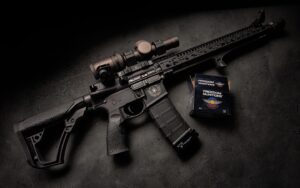

Maryland remains one of the most complex states in the country for concealed carry and use-of-force laws. If you carry a firearm—or plan to—this guide will give you the clear, practical breakdown you need to stay safe and within the law.
Maryland does not follow a “Stand Your Ground” doctrine in public.
Instead, the state requires a duty to retreat whenever safely possible—unless you are inside your home.
You do not have a duty to retreat when:
You are in your home
You are lawfully present
An intruder is attempting to cause death or serious bodily harm
A violent felony is occurring or imminent
Deadly force may be justified if a reasonable person in your situation would believe they were in imminent danger of death or great bodily harm.
You must retreat if you can do so safely!
Deadly force is justified only if:
You are in immediate danger of death or serious injury
Retreat is not safely possible
Your response is proportional to the threat
This is where most Maryland self-defense misunderstandings occur. Many assume that having a carry permit gives them the same protections as Stand-Your-Ground states. Maryland does NOT work this way.
Maryland’s Wear & Carry Handgun Permit allows you to conceal or carry a loaded handgun in public.
But the permit does not override location-based restrictions.
Permit holders may not carry in:
Schools (public or private K-12), school buses, school property
Childcare centers, preschools, daycare facilities
Government buildings, state-owned buildings, county/city buildings
Public infrastructure areas: power plants, gas facilities, water plants
Polling places during elections
Hospitals, health-care facilities, mental health facilities
Stadiums and large public venues (based on property policy)
State Parks, State Forests, Chesapeake Forest Lands (unless hunting is specifically permitted)
Mass transit areas (varies; always verify before travel)
Private businesses unless the owner specifically permits firearms (Currently blocked by Federal Injunction in Novotny v. Moore and is NOT being enforced right now)
Any property with signage prohibiting firearms
Areas where federal law prohibits carry
Maryland’s newer laws treat private property differently than many states:
If a business does not post “guns allowed,” firearms are presumed prohibited unless permission is granted.
To legally justify deadly force in Maryland, five key conditions must generally be met:
Trespassers or individuals committing crimes cannot claim self-defense.
You cannot be the aggressor.
Threat must be immediate—not future, verbal, or hypothetical.
Deadly force cannot be used for minor assaults, property disputes, or non-lethal confrontations.
Only use deadly force to stop deadly force.
When inside your home, Maryland gives you broader protection. Outside your home, the law becomes much more restrictive.
A vehicle is not treated the same as a home in Maryland.
You still have a duty to retreat if safely possible
Deadly force is justified only if an attacker poses imminent deadly harm
Simply being approached does not justify drawing or firing a gun
However, if you are trapped in the vehicle or attacked with a deadly weapon, retreat may not be safely possible changing the legal analysis.
In Maryland, you cannot use deadly force to defend property alone.
A threat to property (cars, belongings, theft, trespassing) is not enough.
There must be an imminent threat to a person.
Many concealed carriers do not understand the aftermath. Plan for the following:
Police will treat the incident as a potential crime until the investigation determines otherwise.
This is standard procedure.
You should provide minimal facts:
You were attacked
You feared for your life
You want to cooperate
You want an attorney present
Do not give detailed statements while under stress.
Police, prosecutors, and forensics teams review:
Necessity of force
Whether you attempted retreat
Whether you were legally carrying
Whether the threat was imminent
Whether the force was proportional
Maryland is known for aggressive prosecution in gun cases.
Family or estate of the attacker may sue for damages.
Even a justified shooting can result in:
Media attention
Job consequences
Online harassment
Civil litigation
Emotional trauma
This is why self-defense insurance and legal protection plans are essential for Maryland permit holders.
Maryland courts consider whether you could have walked away.
A permit is not blanket permission.
Proficiency strengthens both safety and legal defensibility.
Maryland law expects you to attempt to avoid deadly encounters.
Do not navigate a self-defense investigation alone.
Everything you say can be used against you in civil or criminal proceedings.
Maryland is one of the most restrictive states regarding:
Where you can carry
When deadly force is justified
Duty to retreat
Civil liability
The seriousness of post-incident consequences
Your carry permit gives you the right to be armed, but the state imposes strict limits on when and where you can use that firearm.
Your best defense is:
Knowledge
Training
Sound judgment
Legal preparedness
Are you thinking about getting your Maryland CCW? Now is the perfect time to take the first step. Schedule your course today with our experienced team of NRA-certified instructors. We provide comprehensive, hands-on training designed to give you the confidence, knowledge, and legal understanding you need to carry responsibly in Maryland. Secure your spot now and start your CCW journey with Chesapeake Gunslingers.